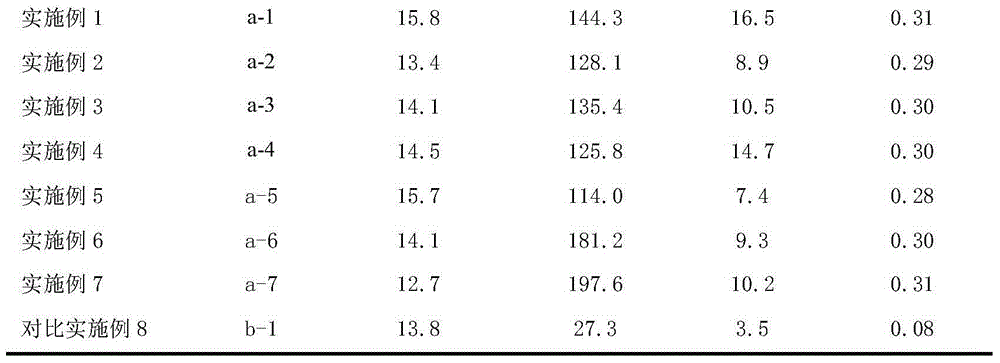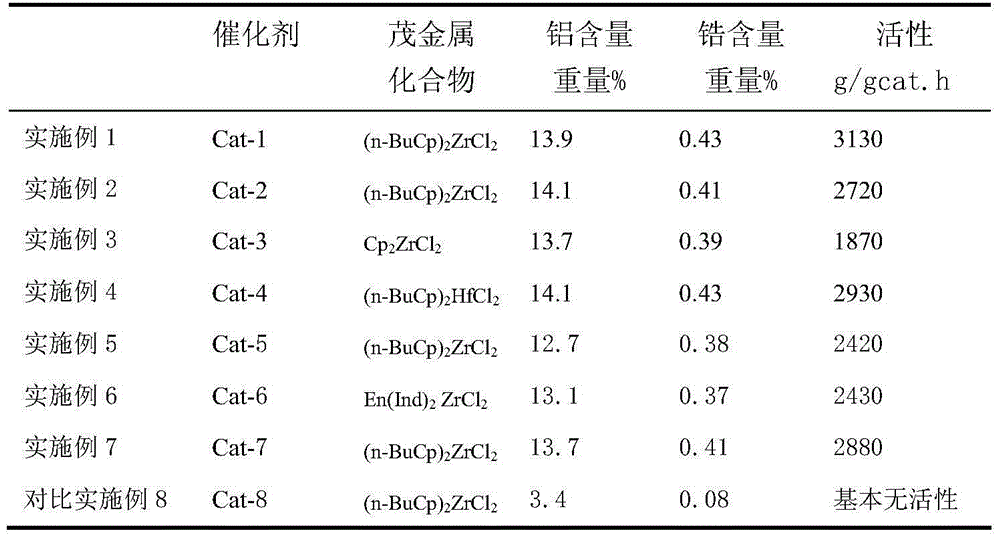Metallocene catalyst system and preparation method thereof
A technology of metallocene catalysts and metallocene compounds, applied in the field of metallocene catalyst systems and their preparation, can solve the problems of unfavorable metallocene catalyst active center release and complex preparation methods, and achieve catalysts and polymers with good morphology and simple preparation methods , the effect of narrow dispersion
- Summary
- Abstract
- Description
- Claims
- Application Information
AI Technical Summary
Problems solved by technology
Method used
Image
Examples
Embodiment 1
[0029] Comonomer treatment: use 10% NaOH solution to remove the polymerization inhibitor before use of styrene and divinylbenzene, and then use it after washing 3 times with deionized water; use neutral oxidation for ethylene glycol dimethacrylate The aluminum chromatographic column was used after removing the polymerization inhibitor. The following examples do not specifically illustrate that the comonomers are used after treatment.
[0030] Preparation of organic porous support: In a 250ml glass reactor, add 150ml ethanol and 15ml deionized water, then add 8ml (about 7.4g) styrene, 8ml 55% (about 7.5g) divinylbenzene and 5ml dimethyl Ethylene glycol acrylate (about 4.8g), stirred at room temperature for 5 minutes, then added 2% polyvinyl alcohol (polymerization degree: 1750) of monomer mass at 45°C, stirred for 1 hour to dissolve the polyvinyl alcohol stabilizer, Then add 10ml DNBP and 1.5% AIBN of monomer mass, raise the temperature to 70°C, react for 3 hours, then raise t...
Embodiment 2
[0033] Preparation of organic porous support: In a 250ml glass reactor, add 108ml ethanol and 12ml deionized water, then add 4ml (about 3.9g) styrene, 4ml 55% (about 3.7g) divinylbenzene and 2ml dimethyl Ethylene glycol acrylate (about 2.0g), stirred at room temperature for 5 minutes, then added 2% polyvinyl alcohol (polymerization degree: 1750) of monomer mass at 45°C, stirred for 1 hour to dissolve the polyvinyl alcohol stabilizer, Then add 4ml DNBP and 1.5% AIBN of monomer mass, raise the temperature to 70°C, react for 3 hours, then raise the temperature to 80°C, react for 5 hours, stir at 600 rpm, wash with ethanol 3 times, and dry Finally, the porous organic carrier a-2 is obtained.
[0034] Loading of the metallocene catalyst: 3.2 g of the organic porous carrier a-2 prepared by the method of the present invention was vacuum filtered in a vacuum dryer at 120° C. for 24 hours. Add the treated carrier into a 250ml nitrogen-substituted reactor, add 21ml of 10% (mass percent...
Embodiment 3
[0036] Preparation of organic porous carrier: The preparation of organic porous carrier in Example 3 is different from Example 2 except that the amount of porogen used is different, the preparation steps are the same as the amount of other reagents, and 7mlDNBP is added in Example 3 instead of adding 4mlDNBP to prepare The obtained organic vehicle is designated as a-3.
[0037] Loading of the metallocene catalyst: 4.5 g of the organic porous carrier a-3 prepared by the method of the present invention was vacuum filtered in a vacuum dryer at 120° C. for 24 hours. Add the treated carrier into a 250ml nitrogen-substituted reactor, add 25ml of 10% (mass percent) MAO (produced by CNPC Lanzhou Chemical Research Center) toluene solution, and stir at 20°C for 1 hour. Then add 0.18 g of Cp 2 ZrCl 2 (Dicyclopentadienyl zirconium dichloride) metallocene compound, 10ml of toluene was stirred for 0.5 hours, then reacted at -20°C for 3 hours, the solvent was removed after the reaction, an...
PUM
 Login to View More
Login to View More Abstract
Description
Claims
Application Information
 Login to View More
Login to View More - R&D
- Intellectual Property
- Life Sciences
- Materials
- Tech Scout
- Unparalleled Data Quality
- Higher Quality Content
- 60% Fewer Hallucinations
Browse by: Latest US Patents, China's latest patents, Technical Efficacy Thesaurus, Application Domain, Technology Topic, Popular Technical Reports.
© 2025 PatSnap. All rights reserved.Legal|Privacy policy|Modern Slavery Act Transparency Statement|Sitemap|About US| Contact US: help@patsnap.com



